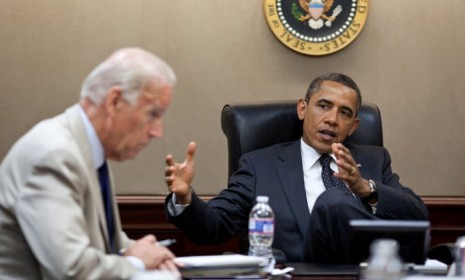Will the U.S. regret suspending food aid to North Korea?
After the North Korean government broke a promise to halt long-range missile launches, Washington is stiffing the rogue nation's hungry masses

A free daily email with the biggest news stories of the day – and the best features from TheWeek.com
You are now subscribed
Your newsletter sign-up was successful
In North Korea, promises are apparently made to be broken. The Obama administration confirmed this week that it had suspended planned food aid to the rogue communist regime in response to Pyongyang's proposed April launch of a satellite-carrying rocket. The U.S. says the hermited nation is violating a February deal that secured aid in exchange for freezing its controversial weapons programs. Will America's food refusal bring North Korea back in line, or merely aggravate the situation? Here's what you should know:
How badly does North Korea need this aid?
Quite desperately. The government's disastrous policies have destroyed the country's economy. Since the 1990s, millions have starved to death, and the regime relies on foreign help to feed its people. The U.S. stopped sending aid in 2009 after negotiations to curb Pyongyang's nuclear weapons program broke down. In February, the U.S. agreed to ship the country 240,000 tons of grain, intended for children and pregnant women, after the World Food Program warned that a new wave of shortages had left three million North Koreans at risk of starvation.
The Week
Escape your echo chamber. Get the facts behind the news, plus analysis from multiple perspectives.

Sign up for The Week's Free Newsletters
From our morning news briefing to a weekly Good News Newsletter, get the best of The Week delivered directly to your inbox.
From our morning news briefing to a weekly Good News Newsletter, get the best of The Week delivered directly to your inbox.
Then why hold back the food now?
The government of Kim Jong Un — who took over when his father, Kim Jong Il, died in December — promised to suspend its nuclear activities and long-range missile launches when the U.S. agreed to send the much-needed food. Obama administration officials say they're not trying to punish Pyongyang — they simply have lost confidence that the isolated communist government will follow through on its commitments and deliver the aid to the people who need it. Pyongyang insists it has done nothing wrong, calling the satellite launch a peaceful scientific project that has nothing to do with the activities it agreed to halt.
Will any good come from withholding aid?
It certainly won't hurt the "unsvelte Kim Jong Un," says Mark Thompson at TIME. It's his hungry subjects who will suffer. But the U.S. can't very well look the other way, says Peter Hartcher in Australia's The Canberra Times. It doesn't matter if this rocket only holds a satellite. North Korea is a "nuclear-armed rogue state" with enough material for a half dozen atomic bombs, lacking only a missile capable of delivering them. C'mon, says Mark P. Barry at World Policy Blog, let's view this missile launch in perspective. The young Kim is just showing off for the folks back home as "part of consolidating a new regime."
A free daily email with the biggest news stories of the day – and the best features from TheWeek.com
Sources: BBC News, Canberra Times, Foreign Policy, TIME, World Policy
-
 Buddhist monks’ US walk for peace
Buddhist monks’ US walk for peaceUnder the Radar Crowds have turned out on the roads from California to Washington and ‘millions are finding hope in their journey’
-
 American universities are losing ground to their foreign counterparts
American universities are losing ground to their foreign counterpartsThe Explainer While Harvard is still near the top, other colleges have slipped
-
 How to navigate dating apps to find ‘the one’
How to navigate dating apps to find ‘the one’The Week Recommends Put an end to endless swiping and make real romantic connections